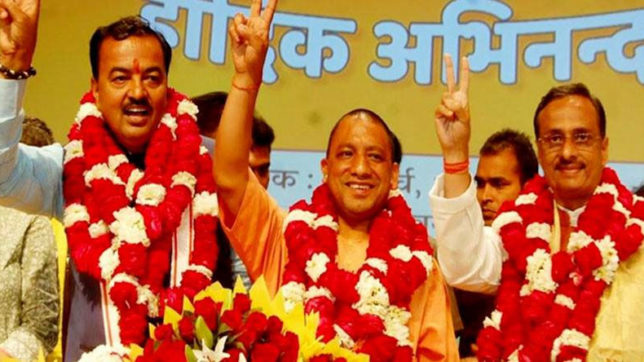The shift of Dalit voters in favour of the BJP was one of the prime reasons behind its landslide victory in the 2014 General elections and in the 2017 UP assembly elections. In the past two years, the trend of Dalits supporting the BJP has only intensified. To repeat 2014 like performance again in UP, the BJP is planning to appoint a third deputy Chief Minister in Uttar Pradesh from the Dalit community. According to a One India report, during the upcoming UP cabinet expansion, a Dalit deputy CM may also take oath. The party will elect a Dalit face for the post of deputy CM from the elected MLAs in the current assembly. Some news faces will also be introduced in the cabinet and few are likely to lose their portfolios.
The decision to appoint a Dalit deputy CM is of utmost importance considering the fact that Uttar Pradesh has 22% Dalit population that has been voting en-masse in favour of Bahujan Samajwadi Party of four-time Uttar Pradesh CM Mayawati, but this trend suffered a major setback in 2014 when the BJP successfully managed to woo Dalit voters in its favour. As a result of this, the BSP failed to win even a single seat in the 2014 General elections and its debacle continued in the 2017 UP assembly elections as well.
The BJP has been working relentlessly to bring non-Yadav OBCs and non-Jatav Dalits in its favour in the view of the SP-BSP coalition ahead of 2019 General Elections.
In order to isolate Dalits from the BJP, the opposition parties orchestrated unrest among the Dalits on several occasions but that resulted only in shifting more and more number of Dalits in BJP’s favour. Their modus operandi is to create a ‘BJP versus Dalit’ narrative. However, the opposition has failed to make any impact whatsoever. One example of this can be seen in Municipal elections held in Maharashtra in April. The Dalits supported the BJP in big numbers, even though huge protests were orchestrated by vested interests after the Supreme Court judgment regarding the SC/ ST Act on 2nd April. In the recently concluded Karnataka elections BJP won 31 seats where Dalits had a significant influence. The BJP gained 22 seats in Dalit influenced constituencies, earlier it had won only 9 seats in those constituencies.
Recently, Milind Kamble, Chairman of Dalit Indian Chamber of Commerce and Industry (DICCI) appreciated PM Modi’s efforts for the upliftment and the development of dalits. He said, “In the tenure of the Prime Minister Narendra Modi’s government, maximum work has been done for the development of Dalits. From the formulation of schemes in the interest of the Dalits and their effective implementation, the performance of the Narendra Modi government has been comparatively better than the government of former Prime Minister Manmohan Singh”. He also praised PM Modi’s Mudra scheme. He said, “Through the Mudra scheme, nearly 2.75 crore youngsters in the country belonging to SC/ST have benefitted”. The BJP has gained enormous support from the Dalit community mainly because of schemes like these and its work towards social and financial inclusion of Dalits. The BJP worked in the direction of empowering the Dalit community instead of appeasing them, and as a result of this, the likes of Mayawati are now facing existential crisis and in order to keep her party and her Dalit politics relevant she is aligning with her rival party-SP.
The President of India also belongs from a Dalit community, who was appointed by the BJP. Many big Dalit leaders like Ramdas Athawale and Ram Vilas Paswan aligned with the BJP. In the parliament, maximum numbers of Dalit MPs are from the BJP. Very recently, Uttar Pradesh CM Yogi Adityanath has pitched for quota for Dalits in so-called minority run institutions like Jamia Milia Islamia (JMI) and Aligarh Muslim University (AMU). CM Yogi said, “If an institution like Banaras Hindu University can give Dalit quota, why can’t minority-run institutions do that.”
The appointment of a Dalit deputy CM in Uttar Pradesh would not only send the signal to the community that BJP is looking out for them but also be an acknowledgement of the fact that it is in favour of representation rather than hollow promises and appeasement politics.




























